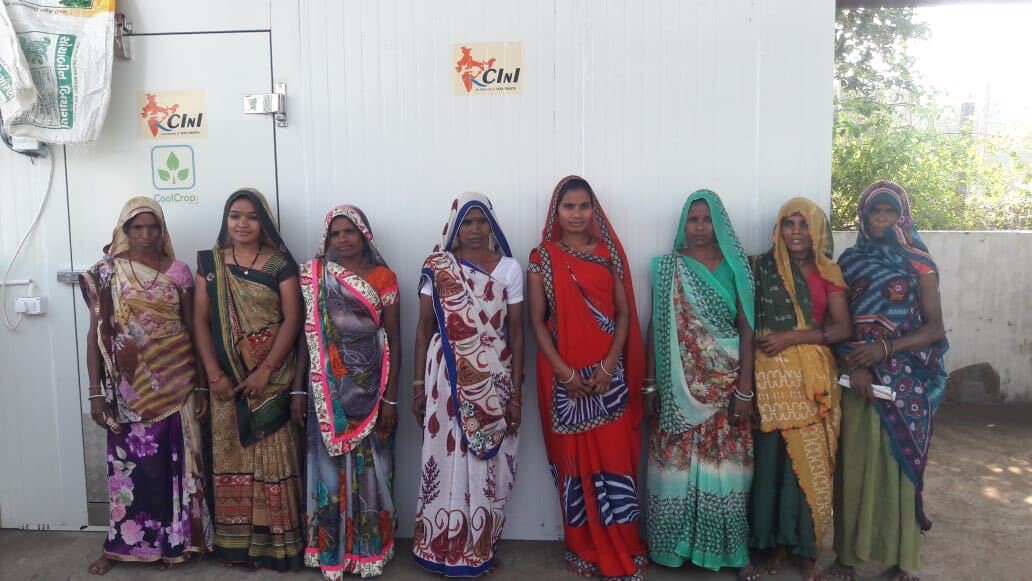Why cold storage matters
January 20, 2021 | By Dorothy PomerantzMuch of the world takes refrigeration for granted. In the U.S., consumers don’t think twice about the cooling power needed to transport fruits and vegetables from thousands of miles away to spray-misted produce aisles at the supermarket.
But in parts of India, the idea that crops can be kept fresh from farm to table is almost unheard of. Typically, smallholder farmers bring their produce to the local market by bike as soon as it’s harvested. Much of what doesn’t get sold is thrown out.
The scale of the problem is staggering. India is the world’s second largest producer of fruits and vegetables but watches as much as 35% of all its produce goes to waste for lack of a cold chain infrastructure.
BASE, a Swiss nonprofit focused on sustainable energy and climate change solutions, has developed an innovative project that could help. It’s working with Empa, a Swiss materials science and research institute, and with local partners to provide access to data and to solar-powered cold storage facilities for smallholder farmers in India, minimizing food waste and increasing the farmers’ revenue.
This creative use of data caught the attention of data.org, an organization backed by the Mastercard Center for Inclusive Growth and the Rockefeller Foundation that aims to build the field of data science for social impact. This week, data.org named BASE as one of eight awardees of its new $10 million Inclusive Growth and Recovery Challenge.
The Challenge is a part of data.org’s larger effort to narrow the digital divide and tackle society’s most significant social problems with the use of data science. For instance, the use of easily accessible, quick-response data is vital for these farmers to thrive in an increasingly digital world. The private sector has had the technology and expertise to capitalize on this kind of data for years. Yet nonprofits and governments have lagged behind, lacking the tools, training and access to rich data sources to create more impactful services and deliver them faster. Projects like BASE’s should be able to help.
The BASE project allows farmers access to pre- and post-harvest information and market intelligence to optimize their decisions on produce and farm management, and enables them to store their produce at sustainable solar-powered cooling facilities, paying only for the space they use. Every farmer who stores their crops will also get access to a mobile app, Your Virtual Cold-Chain Assistant, which is being developed for launch.
The app will help farmers make better decisions about what, where and how to store and sell their produce to make the most profit. This will help smallholders in India break the negative cycle of poverty – while also improving food security and minimizing the impact of food production on the global climate.

“Similar technologies are being used by high-end farmers,” says Jasmine Neve, deputy director at BASE. “We know it’s really valuable, but we also know that at the moment, it’s not accessible to smallholder farmers.”
This project is one of several data.org is working to support. The Challenge issued a call for proposals for transformative data science solutions that could advance inclusive growth across the world. Awardees were selected from over 1,200 applications, and are based in the U.S., Chile, Mozambique, Togo, Australia, Mexico, India, Denmark, Switzerland, Nigeria and Tanzania.
“The eight projects recognized by the Challenge not only are visionary, but also practical,” says Danil Mikhailov, executive director of data.org, which relaunched last year to build the field of data science for social impact. “We believe their innovative uses of data science will one day fundamentally – and positively – impact the way we live our lives.”
BASE will receive grant funding to support development of the mobile app as well as technical assistance from data.org’s network of data scientists to build the machine learning algorithms needed to transform millions of data points into simple information that farmers can easily use. They plan to have the machine learning built within 12 months and a pilot app available to farmers in India within two years.
Neve believes the project has the potential to be replicated and scaled in different markets around the world, generating a significant economic and environmental impact. The project estimates that farmers who use the app will be able to increase their income by up to 30% while also reducing greenhouse gas emissions by up to 49%, aided by the solar-powered cooling centers.
“This is such an enormous opportunity,” Mikhailov says. “Like Challenge awardee BASE, civic and nonprofit organizations are now seeing the potential for data science solutions to address the world’s most pressing social problems. At data.org, we look forward to forging partnerships across sectors and industries to build the field of data science for social impact — which will in turn build a brighter future for all.”